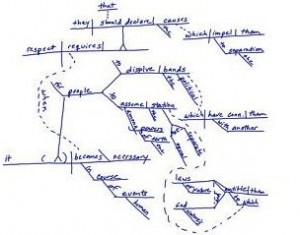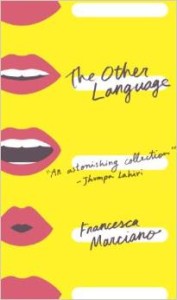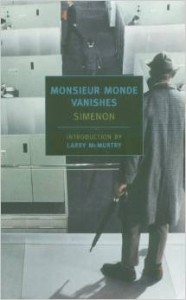 I am lucky to have read three excellent books in a row, Monsieur Monde Vanishes, by Georges Simenon in a new translation by Jean Stewart, My Brilliant Friend by Elena Ferrante (translated by Ann Goldstein), and The Other Language, a book of stories by Francesca Marciano.
I am lucky to have read three excellent books in a row, Monsieur Monde Vanishes, by Georges Simenon in a new translation by Jean Stewart, My Brilliant Friend by Elena Ferrante (translated by Ann Goldstein), and The Other Language, a book of stories by Francesca Marciano.
 The stories in the The Other Language are sharply observed vignettes from Italy, Africa, Paris, New York. Almost all have a middle-aged female protagonist. Here are a few lines from “The Presence of Men,” about a very gentle yoga-teacher’s reaction to a husband’s affair:
The stories in the The Other Language are sharply observed vignettes from Italy, Africa, Paris, New York. Almost all have a middle-aged female protagonist. Here are a few lines from “The Presence of Men,” about a very gentle yoga-teacher’s reaction to a husband’s affair:
“Lara stood up from the kitchen table, where they were eating a spinach and beluga lentil salad, and hurled the plate across the room. She saw the crumbled feta scatter in slow motion, then land on his shirt like snowflakes.
She detected a flash of terror in his eyes and knew that at last she’d gained some power over him. She immediately furthered the opportunity and slapped him in the face. The gesture felt artful and precise as if, along with the shock, a supernatural force had just lodged inside her and was going to stay for good.
Sadly, rage turned out to be a bad drug; it never tasted as good as the first time and when it dissolved it left her limp on the floor like a used dishrag.”
 Georges Simenon is best know for his Maigret mysteries. These genre pieces have a portly, married, civilized Parisian superintendent as their protagonist, and to me they are exquisite French pastries, undemanding and thoroughly enjoyable. But a new series of translations of Simenon’s work has come out from the New York Review of Books Classics series, each introduced by a contemporary author. Monsieur Monde Vanishes is a short, existential tale of a man who on his 48th birthday simply walks out of his established routine leaving his life behind. In tone, it reminds me of Camus’ The Stranger, a similarity Larry McMurtry notes in his introduction. The prose is exquisite. Here’s a sample:
Georges Simenon is best know for his Maigret mysteries. These genre pieces have a portly, married, civilized Parisian superintendent as their protagonist, and to me they are exquisite French pastries, undemanding and thoroughly enjoyable. But a new series of translations of Simenon’s work has come out from the New York Review of Books Classics series, each introduced by a contemporary author. Monsieur Monde Vanishes is a short, existential tale of a man who on his 48th birthday simply walks out of his established routine leaving his life behind. In tone, it reminds me of Camus’ The Stranger, a similarity Larry McMurtry notes in his introduction. The prose is exquisite. Here’s a sample:
“He was not thinking of Madame Monde; he was not thinking of anything. He was conscious of moving restlessly in the midst of an outsize universe. His shoes were covered with fine dust. He was intensely aware of his companion’s scent…
The quietness was oppressive, the room seemed empty, there was too much unstirring air between the few customers, and every sound was detached, assumed importance: the exclamation of a card player, the click of billiard balls, the snap of the lid of the soiled-linen hamper as the waiter opened and closed it. The lights were switched on, but then, in the dusk, the slate-gray street proved a depressing sight, with its curious procession of men, women, and children, walking fast or slowly, brushing up against or pushing past one another, all strangers to the rest, each going God knows where and perhaps nowhere, while obese buses bore past their full loads of tight-packed humanity.”
And finally, my favorite of the three, My Brilliant Friend. This novel of two girls growing up in hardscrabble Naples is engrossing from start to finish, and captures perfectly the perspective of a young girl. The story is often dark, and their world is treacherous:
“Our world was like that, full of words that killed: croup, tetanus, typhus, gas, war, lathe, rubble, work, bombardment, bomb, tuberculosis, infection. With these words and those years, I bring back the many fears that accompanied me all my life.
You could also die of things that seemed normal. You could die, for example, if you were sweating and then drank cold water from the tap without first bathing your wrists: you’d break out in red spots, you’d start coughing, and be unable to breath. You could die if you ate black cherries and didn’t spit out the pits. You could die if you chewed American gum and inadvertently swallowed it. You could die if you banged your temple. The temple, in particular, was a fragile place. We were all careful about it. Being hit with a stone could do it, and throwing stones was the norm.”
Ferrante herself is a mystery–perhaps a pseudonym–but this is the first novel in a trilogy, so more treats in store for me. The hard-sought pleasure of good prose is such a delight!
Thanks for the list of three delicious books. I feel like I have a fresh and yummy fruit salad waiting for me. Simenon I have long relished, but the others I’ve not tasted.
You’re most welcome! They are yummy.